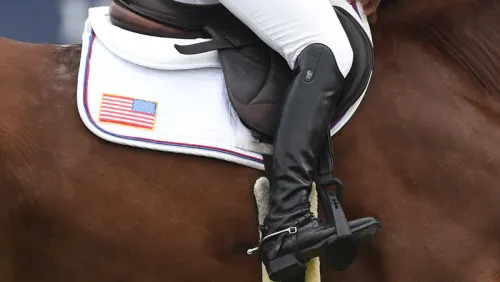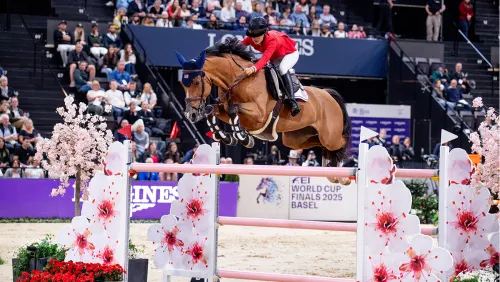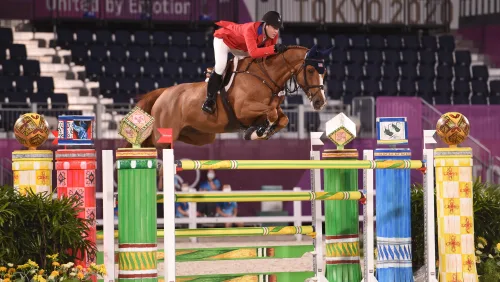When the opportunity arises, Margie Engle likes to look at the plaques decorating the walls of Rolex Stadium in Lexington, Kentucky, plaques that recognize those exemplary riders who have been inducted in the Show Jumping Hall of Fame.
“When I started out, I couldn’t take lessons with a lot of the top trainers and riders,” Engle said. “I worked as a working student, so I used to watch them when I was young, when I was grooming. I would try and learn by watching them in the schooling area and so forth. They’re all people I looked up to, like Rodney Jenkins and Michael Matz and Katie [Prudent], all of them.”
The rest is history: Engle has been a staple of U.S. show jumping for decades. She’s won the American Grandprix Association Rider of the Year a record 10 times—the only person to do so more than four times. She competed in the 2000 Sydney Olympics, earned team silver in the 2007 Aachen FEI World Equestrian Games and three Pan American Games medals, and represented the U.S. in 17 FEI World Cup Finals.

Margie Engle (pictured here with Royce in 2018) was inducted into the Show Jumping Hall of Fame class of 2021. Mollie Bailey Photo
On March 25, the Hall of Fame announced Engle would be joining her childhood idols in an induction ceremony planned to take place during the Devon Horse Show (Pennsylvania). While that show has been canceled and the induction ceremony not yet rescheduled, we caught up with Engle to celebrate the honor.
What were your emotions when you learned you had been inducted?
I’ve always been interested in the history of the sport, and I always look in Kentucky at the different people on the Hall of Fame. It was just a great honor when I heard. Just to be mentioned with some of those people was very exciting for me.
What did the last year with COVID-19 look like for you? What were the positives and negatives?
Everyone knows the negative parts of it. We didn’t get to go to Europe last year, and a lot of the Global Tour shows, none of those went. A lot of our plans changed. But you have to look at the silver lining in everything. We were very fortunate where we could keep doing what we love to do and ride the horses and work with the horses.
My husband and I, I don’t think we’ve ridden together since we went on a cattle-drive over 20 years ago. He’s a vet, but he could only do emergency-type work at the beginning. We were able to trail ride and go and enjoy the horses.
I was able to work with some of the young horses at home. It was nice to be focused on working on different things with the horses and your own riding, instead of worrying about getting to the next horse show.
We travel our whole life, week in and week out, and I have for I don’t know how many years—probably more than I care to admit. It was nice to be home for a little bit, too. We got to actually spend some time at home and doing things that we don’t normally get to do.
ADVERTISEMENT
Which horse did your husband Steve Engle get to ride?
My grand prix horse Dicas was the one Steve could ride on the trail because he’s probably one of the quietest, most relaxed of all of them. He’s just kind of like a big puppy. He’s very sweet, so he was the one that my husband was able to go out on. And Dicas enjoyed the down time and doing all of that. He grew up a lot in the last year or two.

“It’s something that’s really in my blood and something that I’ve always cherished,” said Margie Engle, shown here riding her “husband horse” Dicas. Kimberly Loushin Photo
What keeps you motivated after being in the horse business all these years?
It’s just the passion for the horses. I always loved being around them. It was so difficult for me to do when I started off. It’s something that’s really in my blood and something that I’ve always cherished.
They’re magnificent animals, and they give us their unconditional love, unless we do something to mess it up. It’s just a great working relationship, and every day is interesting. I have different things to work on and different personalities from different horses. It never gets boring.
How was it difficult for you to get started in the horses?
No one in my family really rode, and it is an expensive sport. My parents were very focused on our school and so forth, and both my parents worked. I had to do everything—I used to work around the stables in exchange for lessons and for rides. My parents were working full time. We had a carpool on the weekends, but during the week my dad was [an accountant] and my mother was a schoolteacher, then became a principal. She actually was at the same public school I went to. At one point when I finally got a job at the barn, I was all excited I had a job, but I wasn’t driving or anything yet, so I had to look at the bus schedule to get back and forth to the barn because the other kids didn’t ride during the week.
It’s kind of funny: The owners always said, “You would do anything to ride. Our kids have it right in the back yard, and they could kind of take it or leave it.” The kids liked the horses but didn’t have the same passion. I think sometimes the harder something is for you to get and to achieve, the more you want it.
I never owned part of my own horse until I was my mid-20s, I think. I did a lot of catch riding for other people. I broke the ponies and horses at the barn because of my size when I was younger. I’d do anything to ride. I didn’t care what they put me on. I rode a lot of the sales horses and ponies; the ones off the racetrack; ones that they raised.
Which horse changed everything for you?
There were multiple horses that kind of helped you develop your career, and for me to just say one would be impossible. But Daydream was the first grand prix horse I was able to keep. Everything else I rode that was nice would either get sold or the people would start riding again.
ADVERTISEMENT
I started him when he was like 5 or 6. When he started to do the bigger classes, a lot of people were trying to buy him. My father actually helped me put a syndicate together, a limited partnership, and he was the first nicer horse at the jumper level that I was able to keep riding.
Once I got him, and people started seeing me do well with him, other people started sending me other horses for that level to bring along. Then I had Saluut II, Sebastian, and all those.
Was there a horse that surprised you?
I tend to be like, “The glass is half full.” I’ve always hoped, and I believed in them, and they started to believe in themselves. When I had Saluut at first, he was so careful, and they mistook that for not having much scope. But I always said, “What he lacked in scope he made up for in heart and in carefulness and for trying.”
When I first had him, everyone said, “Oh, he’s going to be more of a junior jumper.” But he was really young, too. He was so, so careful; it made it look like he didn’t have that much scope. He went on to be quite a bit more I think than a lot of people thought.
Is there anything you wish you had done differently, knowing what you know now?
I’m sure if I had a little more self-preservation, I probably shouldn’t have ridden some of the horses I did over the years. But it was a challenge. Especially when you’re younger, the more someone says a horse can’t do or you’re not going to be able to get it to do this or that, the more of a challenge it was.
Saying that though, you learn something from each and every horse. The horses that maybe weren’t as nice as some of the ones I later was riding, they teach you how to deal with different problems. They do make you appreciate the good ones that much more. I don’t think I could ride some of those at this point. And probably shouldn’t have then – I probably would have had a lot fewer broken bones.
Is there something people wouldn’t necessarily know about you?
We grew up a very close-knit family. And even though we do travel all the time, I am very family-oriented. I don’t get to spend as much time with my family as I’d like. It kind of keeps you level because they’re not horse people, and it just keeps everything real. It keeps you out of your little box. They don’t know much about the horses, so you don’t talk about same thing all the time.
Most of all my friends are horse people, that’s it you eat, sleep—and I love it—but it’s nice to be able to talk about other things with your family.















